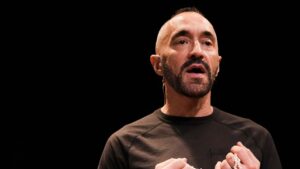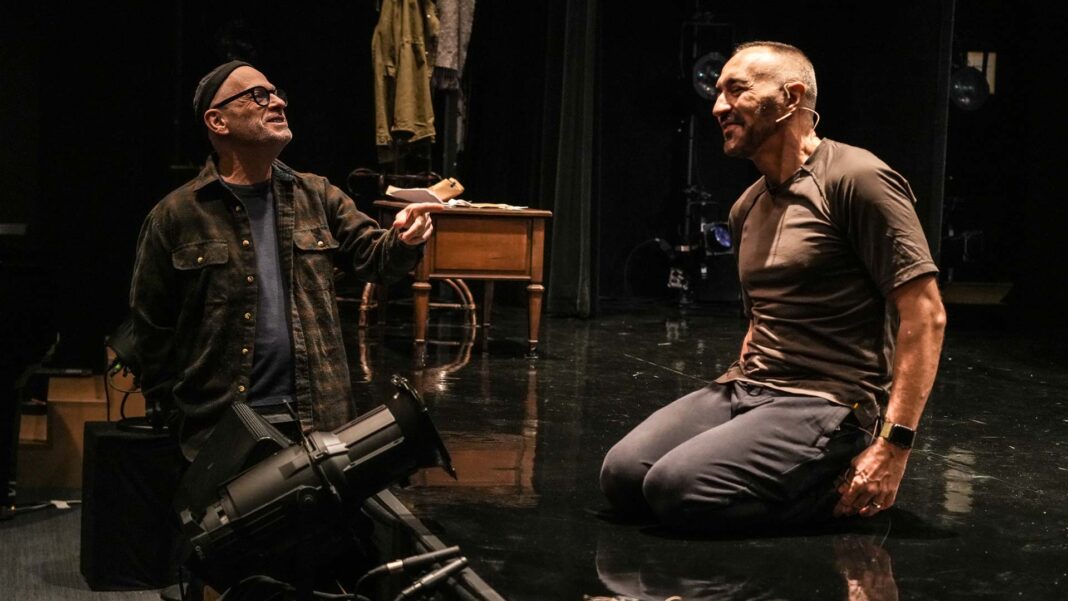Composer David Lang is no stranger to challenging subject matter.
His prisoner of state in 2019 reworked many of the issues Lang had with Beethoven’s Fidelio. The Loser, based on Thomas Bernhard’s novel, features a narrator and a concert pianist telling the story of a friend’s suicide. Anatomy Theater follows a murderess through her execution and autopsy. She sings throughout the process. The Little Match Girl Passion takes a story by Hans Christian Anderson as its inspiration and Bach’s St. Matthew’s Passion as inspiration for the work’s structure. Lang won the Pulitzer Prize in 2008 for that work.
A new one-act opera by Lang, note to a friend, has its world premiere tomorrow at the Prototype Festival in New York. The one-hour work was inspired by Ryūnosuke Akutagawa’s Note to a Certain Old Friend. The writer’s short story, Rashomon, inspired the classic film of the same name by Akira Kurosawa.
Once again themes of death and suicide can be found in Lang’s new opera. Theo Bleckmann sings notes to a friend accompanied by a string quartet. Yoshi Oida directs the production.
In late December I spoke with Lang about note to a friend, Akutagawa’s writing and the presence of themes of death and suicide in his work. What follows are excerpts from our conversation that have been edited for length and clarity. To see the full interview, please go to our YouTube channel.
Though he didn’t write Note to a Certain Old Friend, I want to ask you about something another Japanese writer wrote. That is Haruki Murakami, who said “Death is not the opposite of life, but a part of it.” What is your personal relationship to death and did that perspective inform your writing for note to a friend?
Well, you know, death is sort of my favorite subject. I think what happens when you’re a composer is you spend a lot of time in your studio by yourself. That’s, for me, the great gift of being a composer. You get to spend time in your studio with no one else around and your mind focuses on the things that it wants to focus on. I always end up thinking about death, not because I’m morbid or morose, but because I’m genuinely curious. I have no idea what is coming. My family upbringing was very dark. My mother was a refugee from Nazi Germany. I had a brother who died when I was very young. So death was a big accompaniment to my childhood and a big part of my life growing up.
The way that affected my work was when I started making music I started thinking death is the most important topic that music can deal with. We have things which are just entertainments or things that are about love or things that are about other kinds of feelings or experiences. But when you think about it, love is just something that you have to distract you from what’s going on with your death.
What is The Loser about? It’s about someone who kills himself because he can’t deal with the fact that he can’t be as good as someone else doing something. My piece, Death Speaks, is trying to figure out what the core of Schubert is – which is death. I’m a happy person, so I’m not trying to be miserable, but it’s definitely been a frequent accompaniment to my life.
I saw an interview that you did with 15 Questions. You said “The biggest creative challenge for me, and probably for anyone in a creative field, is committing to make work before you know if you can actually do it.” At what point did you realize you actually could do note to a friend?
One of the things that’s really great about pieces with text: operas, songs, choral works…If they have a text, then you read the text. You think about the text. You rewrite the text. You adjust the text all that time. What you’re doing is you’re using the words and combining them and recombining them to figure out if you believe something and if you have an opinion about something and if that opinion is interesting. So with note to a friend I started rewriting the text.
I love Akutagawa and and I will rewrite it until I find something interesting in it. I realized in this text, which Akutagawa uses, it’s just the letter that he writes to a friend of his explaining he’s thinking about the possibility of killing himself. I determined for myself that what was interesting to me was the idea that someone would have killed himself and would now be coming back to let us know. Well, what’s his life like? What did he think? Where is he now? What’s he doing? What did he have to go through to get to the place he’s in now? That shift from being someone who’s going through a situation that might end up with them killing themselves to being the invention of this character who already has made this journey and is coming back to instruct us about it. That’s when I knew I could do the piece.
Was it mostly the themes of Akutagawa that interested you? Or is there something about the rhythm of the way that he writes that felt musical to you?
I really wanted to find someone who could benefit from the things that opera does. Which is you have text, you invent a character and then use the music to make the character deep and three dimensional and come alive. I have a bunch of his books here and I just kept reading and then I remembered this one. I actually read this many, many years ago. Then I thought that actually is something that I can that I can change. I can adjust.
What I was really looking for was something where I would be able to take a premise from someone else and extract it and adjust it in such a way so that it would be about something that I would understand. I would never presume to understand that I know anything about Japanese culture or I know anything about the situation that Akutagawa himself was going through. So this is not about Japan and it’s not about a particular person. It’s just something where you read the text and it helps me get to the place where I can figure out something I’m interested in doing. After that I forgot about Akutagawa altogether. In fact, there are things in my adjustment of the text where I say exactly the opposite from what Akutagawa says.
What was the thinking that led to it being a tenor voice?

I had this image that this guy is very suave, very pulled together. He says this really great thing where he says he thought that he might hang himself. But then when he thought of what he would look like when he was hanging himself, he says, “Everyone knows how much I care about those things. You remember I ended a relationship with the lover because I didn’t like their handwriting.” He’s very funny and very witty, but he’s very sophisticated.
I remembered my friend Theo Blackmann who is a great cabaret jazz singer and who is one of the most suave and sophisticated people I know. It seemed like it was a really good role for him.
I’m really intrigued by the idea of a tenor with a string quartet. That’s just that’s not a pairing you commonly find.
It’s true. The more I work in opera the more I realize that singers are not vocal ranges or vocal types or any of those things that kind of group people together. Every singer is an individual. Every singer is unique with their own gifts and their own neuroses and their own abilities. Things they can do and things they can’t do that have nothing to do with their range. So I really think this piece was written just for Theo, although I think other people would be happy doing it.
When I think of some of the great pieces of classical music that have dealt with with death I obviously think of Mahler. I think of Schubert. But I’m thinking of pieces that don’t commonly use the human voice. What does the human voice bring to these themes that the absence of a human voice does not?
It brings our focus. It brings the the ability to look at someone and see these emotions, feel these emotions from ourselves and our ability then to project them on the person in front of us. One of the things that happens in opera, which is why we like opera so much, is that these people, if everything works right, if the music is good, the staging is good, the acting is good and the singing is good, we can actually project ourselves into the people on stage and those emotions that that person is going through. The emotions that they’re going through become things that are available for us to go through as well, or to at least consider. I think that’s what we get.
When you hear things in Schubert that are about death or Mahler some of those things are devastating. But the thing that happens when you see a person going through a problem is that person could be me. Maybe there’s a message here for me or something I can learn or something I can feel. To me there’s something very immediate about it which abstract music doesn’t have.
How much does your view of getting older influence both the selection of the material that you want to do and particularly a piece that the Prototype Festival says, “Addresses our eternal human fascinations with death, love, family and suicide.”
I definitely think time goes faster. I will say being able to go half price on the subway is a real perk and I really appreciate that. So there are some pluses to aging. I also think perspective is something that happens. You get to the point where you can look back on the things you’ve done and make a comprehensive list of things you hope you never have to do again. That’s very useful, especially for music, because I think what happens as a composer is you can get into a groove where you feel comfortable writing a certain kind of music and then you don’t have to think about it anymore. The world may even reward you for doing that, for making pieces which are completely dependable and completely what people expect.
For me, it’s very helpful to be older because then I can check myself. I have no idea how many years I have left and how many pieces I have left in me. Hopefully it will be quite a lot, but I don’t have time to do something that I’m not 100% committed to. I don’t have time to do something that I’m not passionate about. I don’t have time to do something that doesn’t resonate deep inside with whatever deeper meaning I’m interested in. So for me it’s very useful. Age is clarifying.
Notes to a Certain Old Friend that Akutagawa wrote is about a person explaining why they killed themselves or why they might kill themselves. Akutagawa killed himself. Do you think suicide is an act of bravery or cowardice?

That’s a really interesting question. I imagine, from what I know, that the meaning of suicide is different culturally between a Japanese audience and an American audience. For me personally I can imagine being in pain so much that it would be a great act of courage to get out. I can imagine being in a situation where I say, “God forbid I’ve had enough. I don’t want to do anything anymore.”
I have seen both my parents pass away and neither of them were particularly happy about it. So I have no idea what awaits me and I have no idea what strength or opinion I will have when the time comes for me to figure out that there’s not much else to live for. I cannot imagine in any culture that it is an easy decision. So I think there’s an element of bravery which probably attaches to it everywhere is my guess.
There is a line in Akutagawa’s The Life of a Stupid Man that I really love. “He wanted to live life so intensely that he could die at any moment without regrets.” Have you lived your creative life as intensely as Akutagawa writes about?
That’s such a great question and that’s something that everybody has to ask themselves. I hope so. I don’t know. I don’t think I’ve lived anything very intensely, but I have a long list of pieces I’m still hoping to finish. So it could be that I have intensity to come.
You say there are pieces that you still need to finish. Does that mean you’ve already begun work on them?
I’ve already begun thinking about them. I haven’t found anyone to commission some of these. But I have things that I’m really curious about and problems to solve and challenges to meet that I’m curious about. I always tell my students that no one is going to commission you to write the piece that you want to write unless you ask them.
People commission you because they have an idea of what their needs are. But there’s no reason why what they need is what you need. How will you know the difference unless you pay a lot of attention to what you need. So I have a long list of projects I need to accomplish before I can shuffle off the mortal coil. That’s why I haven’t started them, but I’ve started them enough to think that they’re fun.
To see the full interview with David Lang, please go here.
Photo: David Lang and Theo Bleckmann at a rehearsal for note to a friend (Photo ©Takaaki Ando/Courtesy Prototype Festival)











